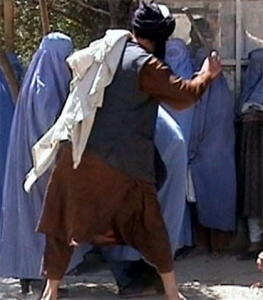Oppression of women a sign of failed states
Nations that oppress women and girls are far more likely to be violent and unstable, according to an analysis by The Economist magazine.
All of the 20 most fragile states in the world practice polygamy, including Guinea, where a coup took place on September 5, the report says.
 And in many places around the globe selective abortions lead to skewed sex ratios creating a dangerous surplus of young single men.
And in many places around the globe selective abortions lead to skewed sex ratios creating a dangerous surplus of young single men.
Societies based on male kinship groups tend to subjugate women through unequal inheritance rights, child marriage and more, the report says.
“Geopolitics should not be viewed solely through a feminist lens, any more than it should be viewed solely in terms of economics or nuclear non-proliferation. But policymakers who ignore half the population cannot hope to understand the world,” the analysis said.
A case in point is Afghanistan. After the US and its allies deposed the Taliban in 2001, primary-school enrolment of Afghan girls rose from zero per cent to more than 80 per cent.
Infant mortality fell by half. Forced marriage was made illegal. Many of those schools were angry and many families ignored the law. But there is no doubt that Afghan women and girls have made great gains in the past 20 years, or that those reforms are now under threat.
A separate report by the Washington-based think tank the Pew Research Center says that women in many countries face harassment for clothing deemed too religious or too secular.
“Religious restrictions around the world often target women, who in many countries face censure because their clothing is considered too religious – or not religious enough. These restrictions frequently take the form of social harassment by individuals or groups, but also sometimes involve official government actions,” the report says.
It found women in 56 countries experienced harassment from individuals or groups due to clothing that was deemed to violate religious or secular dress norms, according to the report.
It said social harassment ranged from verbal abuse to physical violence or killings motivated at least in part by the target’s religious identity.
The report found women in 61 countries faced government restrictions on dress – specifically, regulations on their head coverings.
And the number of countries where women faced social hostilities and government-imposed restrictions related to their dress has risen in the five most recent years of the study.
“Europe had the most countries where women faced social hostilities for violating dress norms, with incidents recorded in 20 countries, or 44 per cent of the 45 nations in the region,” the report said.
“In all of these cases, Muslim women faced discrimination, physical violence and other forms of abuse for wearing head coverings.”
The Pew report said the Asia-Pacific region had the second-most countries with such incidents, with women facing harassment for violating dress codes in 14 of the region’s 50 nations, or 28 per cent.
In 10 of these countries, women were harassed for clothing that was deemed too religious, whereas in six countries, they experienced harassment for attire that was considered too secular. In two countries – India and Indonesia – both types of harassment occurred.
The report said women faced social hostilities for violating dress codes in seven countries in sub-Saharan Africa and six countries in the Americas.
“In the Americas, all instances of harassment targeted women who wore clothing considered too religious,” the report said.
In the Middle East and North Africa, eight of 20 countries saw harassment for overly secular attire, while two countries saw it for overly religious clothing.
Every region had at least some rules about women’s headdress. Europe had the most countries where women’s head coverings were restricted by the government, with instances in 21 of 45 countries.












